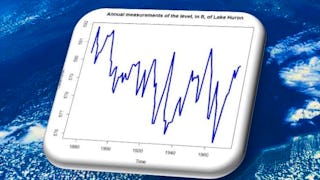This course introduces basic time series analysis and forecasting methods. Topics include stationary processes, ARMA models, modeling and forecasting using ARMA models, nonstationary and seasonal time series models, state-space models, and forecasting techniques.



Expérience recommandée
Détails à connaître

Ajouter à votre profil LinkedIn
27 devoirs
Découvrez comment les employés des entreprises prestigieuses maîtrisent des compétences recherchées




Obtenez un certificat professionnel
Ajoutez cette qualification à votre profil LinkedIn ou à votre CV
Partagez-le sur les réseaux sociaux et dans votre évaluation de performance


Il y a 9 modules dans ce cours
Welcome to Introduction to Time Series! In this module we'll define time series and time series models, and we'll develop some intuition for the fundamental concept of stationarity, and why it's useful.
Inclus
8 vidéos6 lectures4 devoirs1 sujet de discussion
In this module, we'll discuss stationarity in more detail. We'll learn the technical definitions of weak and strong stationarity, and explain why the weaker version is more practical to use. We'll discuss the autocovariance and autocorrelation functions for stationary processes---concepts that will be with us for the rest of the course. And finally, we'll see some examples of ARMA processes, which we'll treat more deeply in the coming modules.
Inclus
9 vidéos3 lectures3 devoirs
In this module, we'll focus on ARMA processes, and what is arguably their most important feature, namely their autocorrelation structure. We'll see how to compute these "from scratch" (with a little help from R for the computations), and look at plots of the autocorrelation function (ACF) to get some intuition for how the ACF of an ARMA process behaves and what it can tell us.
Inclus
10 vidéos4 lectures3 devoirs
In this module, we begin by discussing the ACF's of more complicated ARMA processes. Our main focus, though, is on one-step-ahead forecasts. We learn about the best linear predictor: both how it is defined and how to use it. Finally, we use what we have learned in order to define the Partial Autocorrelation Function (PACF), which is another fundamental tool in the study of stationary processes.
Inclus
9 vidéos3 lectures3 devoirs
In this module, we learn about fitting a stationary time series model to data. The fitting process involves determining what values of the parameters to use. We discuss preliminary estimation and maximum likelihood estimation of these parameters.
Inclus
9 vidéos4 lectures4 devoirs
In this module, we discuss model diagnostics and order selection. Given an ARMA order, we've already seen how to best fit the parameters of the associated model. Given several different fitted models, the tools we develop in this module will allow us to make an intelligent choice about which one to use.
Inclus
7 vidéos3 lectures3 devoirs
This module introduces students to ARIMA and SARIMA modeling techniques, essential for analyzing non-stationary and seasonal time series data. In the first lesson, students will learn to define ARIMA processes, use the Dickey-Fuller test to determine the need for differencing, and fit ARIMA models using R. The second lesson extends these skills to SARIMA models, focusing on identifying seasonality and fitting these models to capture seasonal patterns in data.
Inclus
9 vidéos3 lectures3 devoirs
This module equips students with more sophisticated forecasting techniques beyond one-step-ahead predictions. We treat both (S)ARIMA models and exponential smoothing models and show how to handle forecasts in R. For the simplest of these models, we look inside the "black box" a little bit and demonstrate how these forecasts are generated.
Inclus
9 vidéos3 lectures3 devoirs
This module contains the summative course assessment that has been designed to evaluate your understanding of the course material and assess your ability to apply the knowledge you have acquired throughout the course.
Inclus
1 devoir
Instructeur

Offert par
Recommandé si vous êtes intéressé(e) par Data Analysis


The State University of New York


Coursera Instructor Network


Macquarie University
Préparer un diplôme
Ce site cours fait partie du (des) programme(s) diplômant(s) suivant(s) proposé(s) par Illinois Tech. Si vous êtes admis et que vous vous inscrivez, les cours que vous avez suivis peuvent compter pour l'apprentissage de votre diplôme et vos progrès peuvent être transférés avec vous.¹
Pour quelles raisons les étudiants sur Coursera nous choisissent-ils pour leur carrière ?







Ouvrez de nouvelles portes avec Coursera Plus
Accès illimité à 10,000+ cours de niveau international, projets pratiques et programmes de certification prêts à l'emploi - tous inclus dans votre abonnement.

Faites progresser votre carrière avec un diplôme en ligne
Obtenez un diplôme auprès d’universités de renommée mondiale - 100 % en ligne

Rejoignez plus de 3 400 entreprises mondiales qui ont choisi Coursera pour les affaires
Améliorez les compétences de vos employés pour exceller dans l’économie numérique
Foire Aux Questions
Access to lectures and assignments depends on your type of enrollment. If you take a course in audit mode, you will be able to see most course materials for free. To access graded assignments and to earn a Certificate, you will need to purchase the Certificate experience, during or after your audit. If you don't see the audit option:
The course may not offer an audit option. You can try a Free Trial instead, or apply for Financial Aid.
The course may offer 'Full Course, No Certificate' instead. This option lets you see all course materials, submit required assessments, and get a final grade. This also means that you will not be able to purchase a Certificate experience.
When you purchase a Certificate you get access to all course materials, including graded assignments. Upon completing the course, your electronic Certificate will be added to your Accomplishments page - from there, you can print your Certificate or add it to your LinkedIn profile. If you only want to read and view the course content, you can audit the course for free.
You will be eligible for a full refund until two weeks after your payment date, or (for courses that have just launched) until two weeks after the first session of the course begins, whichever is later. You cannot receive a refund once you’ve earned a Course Certificate, even if you complete the course within the two-week refund period. See our full refund policy.





